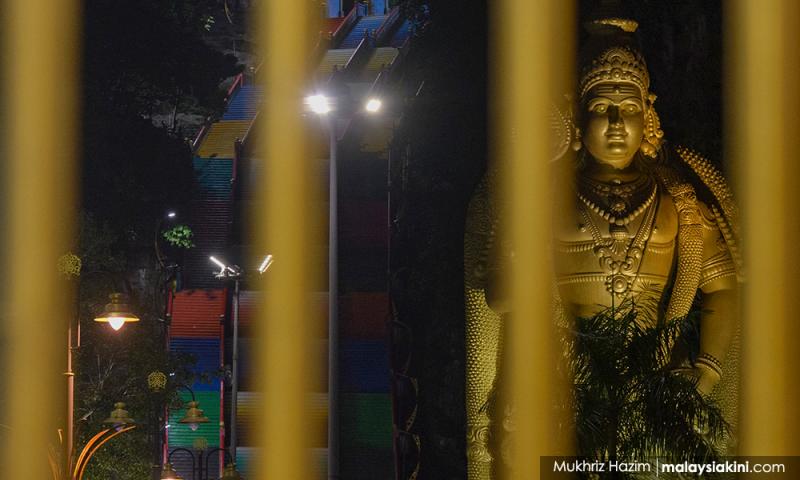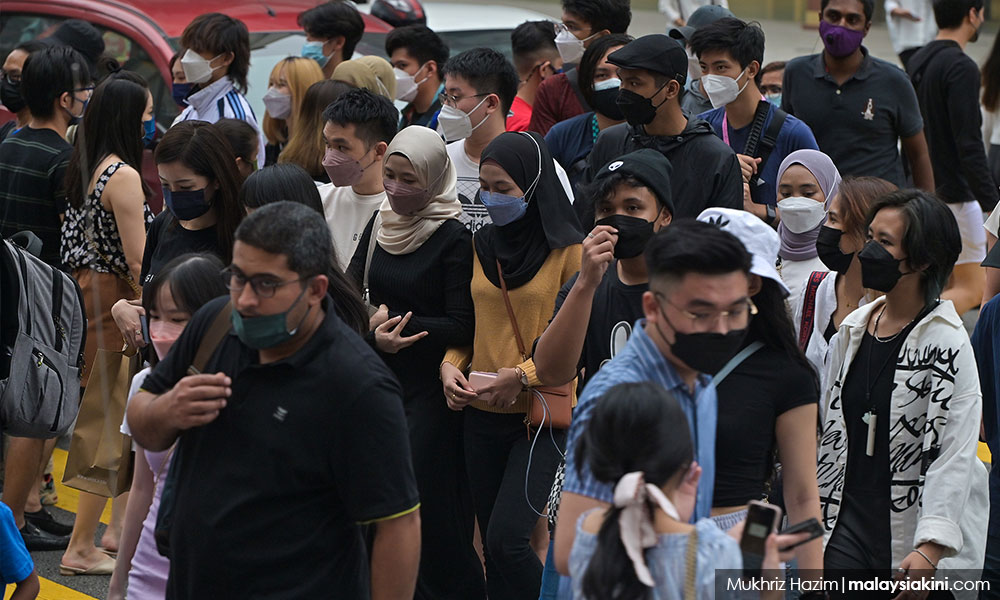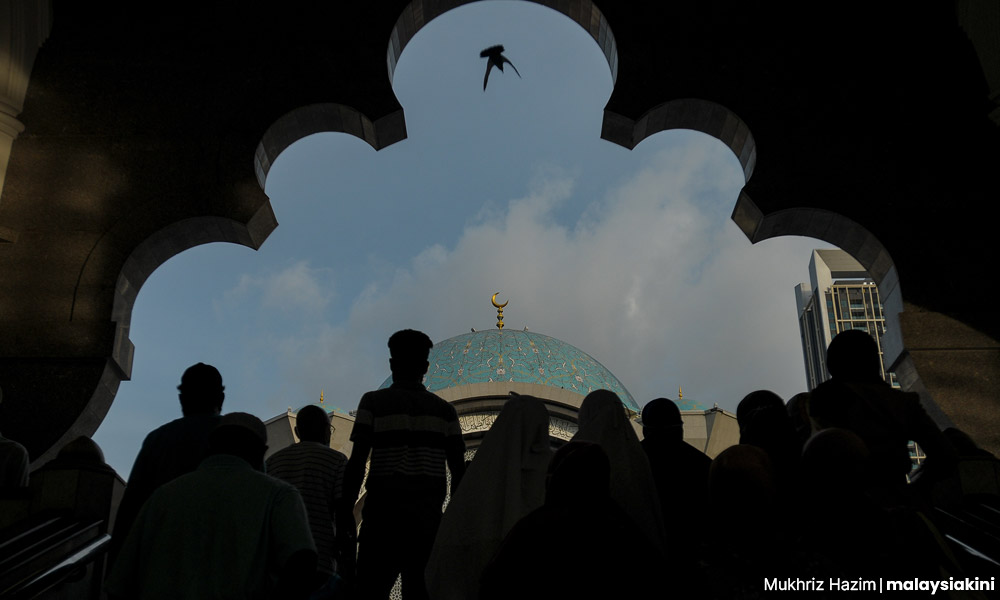
S Thayaparan
“If you’re still confused, please see the state mufti for further clarification,” - Johor Sultan
COMMENT | As a non-Muslim in this country who wants to respect the two-way street of religious tolerance, I have to say I am confused when it comes to the latest fatwa in Johor prohibiting Muslims from attending and participating in religious rituals of other faiths in the state.
The Johor sultan in consenting to this fatwa said that this is “in no way in conflict with interfaith values of tolerance, unity, and understanding as espoused under the ‘Bangsa Johor’ concept.”
Maybe the problem is that I am confused with the Bangsa Johor concept. I wonder if it is in conflict with the Malaysia Madani concept or is it the other way around?
If that were not confusing enough, the Johor sultan said: “The fatwa only prohibits Muslims from taking part in other religious rituals. It is a guideline for them. They can still attend festive events of other faiths.”
According to State Islamic Religious Affairs Committee chairperson Mohd Fared Mohd Khalid, “These non-Islamic religious rituals include in houses of worship, as well as other places.”
First off, where are these other places? Do they include personal residences? Public spaces where people of other faiths express their religious beliefs? After all, Fared said: “Among other things, the ceremony is not accompanied by rituals including religious symbols, or singing religious songs which are against the Islamic faith.”
What does “against the Islamic faith” mean? Could someone please explicitly tell us non-Muslims which ceremonies, religious symbols, or devotional songs are against the Islamic faith?
This is an important point because imagine if someone hummed a religious song or wore a religious symbol in the company of Muslims, this would be going against the Islamic faith, thereby putting Muslims in danger of transgressing this fatwa, at least in Johor.
Or are these symbols, songs, and ceremonies contextual, to be more specific, locational? This, again, is an important facet of this country's two-way street of respect.
I do not know of any issues when it comes to non-Muslim faiths on what specifically offends our faiths. I know of no songs, ceremonies, or symbols which would be against the Buddhist, Hindu, and Christian faiths. I could be wrong.
“If you’re still confused, please see the state mufti for further clarification,” - Johor Sultan
COMMENT | As a non-Muslim in this country who wants to respect the two-way street of religious tolerance, I have to say I am confused when it comes to the latest fatwa in Johor prohibiting Muslims from attending and participating in religious rituals of other faiths in the state.
The Johor sultan in consenting to this fatwa said that this is “in no way in conflict with interfaith values of tolerance, unity, and understanding as espoused under the ‘Bangsa Johor’ concept.”
Maybe the problem is that I am confused with the Bangsa Johor concept. I wonder if it is in conflict with the Malaysia Madani concept or is it the other way around?
If that were not confusing enough, the Johor sultan said: “The fatwa only prohibits Muslims from taking part in other religious rituals. It is a guideline for them. They can still attend festive events of other faiths.”
According to State Islamic Religious Affairs Committee chairperson Mohd Fared Mohd Khalid, “These non-Islamic religious rituals include in houses of worship, as well as other places.”
First off, where are these other places? Do they include personal residences? Public spaces where people of other faiths express their religious beliefs? After all, Fared said: “Among other things, the ceremony is not accompanied by rituals including religious symbols, or singing religious songs which are against the Islamic faith.”
What does “against the Islamic faith” mean? Could someone please explicitly tell us non-Muslims which ceremonies, religious symbols, or devotional songs are against the Islamic faith?
This is an important point because imagine if someone hummed a religious song or wore a religious symbol in the company of Muslims, this would be going against the Islamic faith, thereby putting Muslims in danger of transgressing this fatwa, at least in Johor.
Or are these symbols, songs, and ceremonies contextual, to be more specific, locational? This, again, is an important facet of this country's two-way street of respect.
I do not know of any issues when it comes to non-Muslim faiths on what specifically offends our faiths. I know of no songs, ceremonies, or symbols which would be against the Buddhist, Hindu, and Christian faiths. I could be wrong.

This is important as we have to look out for our Muslim brethren. The Johor sultan said that these are only guidelines. Fared said the same but added that “individuals who violate the guidelines can be prosecuted in accordance with Section 9 of the Johor Syariah Criminal Offences Enactment 1997.”
Fared also said: “This ban is not meant to disturb the harmony between races, but simply to give advice and guidance, so that community leaders are careful in promoting togetherness without violating certain boundaries.”
I am assuming that the community leaders mentioned here are Muslim so this only applies to them but this seems strange, right?
Are there legal repercussions?
First of all, this cannot be a “guideline” if it’s a directive imbued with the force of syariah law. Guidelines can be ignored, dismissed, or transgressed against and there would be no legal repercussions.
So, to be clear, Muslims in Johor do not have a choice. They have to follow these diktats. This again is confusing, because Muslims out of no fault of their own, could run foul of this fatwa because which non-Muslim ceremony is not accompanied “by rituals including religious symbols, or singing religious songs which are against the Islamic faith”?
This would mean Christmas without religious symbols or songs. Wesak without symbols and chants. Thaipusam without symbols and songs which to be honest is going to be very difficult if not impossible. Of course, this only applies I suppose if Muslims attend, right?
The Johor sultan did say Muslims “can still attend festive events of other faiths.” But which religious festivity is without religious symbols, songs, and ceremonies?
Are Muslims prohibited by syariah law in Johor from entering places of worship of non-Muslims because they would be exposed to elements that are defined as going against Islam?

Participation vs observation
This is not about participation, because who really participates in a religious event except the participants? The rest are just observing respectfully and embracing the religious expression of their hosts, right?
So what kind of religious event is the fatwa describing? Going by this guideline, there would be no non-Muslim festivities that Muslims in Johor could attend. Is that the point?
I am sure Muslim political operatives would be allowed to enter places of worship and of course, rich Muslims going to religious festivities of non-Muslims, especially in foreign countries. But it seems that the average Muslim in Johor cannot attend church weddings or Hindu weddings for example because both run afoul of this fatwa.
They also cannot pay their last respects because they will not be able to attend funeral services. Indeed Muslims would be cut off from attending moments of joy or sorrow of their brothers and sisters of other faiths. Not to mention those "other places" which are verboten to Muslims in Johor. Is this what Bangsa Johor is about?
Secondly, why should community leaders (who are Muslim) be “careful” when promoting togetherness? Think about it, can someone be “reckless” when promoting togetherness? Let us forget about religion for a moment. What secular boundaries need to be protected or enforced when it comes to promoting togetherness?
I could argue that “boundaries” in a secular context mean mutual respect, empathy, a willingness to listen and an expectation to be heard in return. All these concepts cultivate camaraderie, cohesion, and the spirit of “though we are different, we are all on this lifeboat together “. But I would not call such boundaries.
These are guidelines.
S THAYAPARAN is Commander (Rtd) of the Royal Malaysian Navy. Fīat jūstitia ruat cælum - “Let justice be done though the heavens fall.”
This is not about participation, because who really participates in a religious event except the participants? The rest are just observing respectfully and embracing the religious expression of their hosts, right?
So what kind of religious event is the fatwa describing? Going by this guideline, there would be no non-Muslim festivities that Muslims in Johor could attend. Is that the point?
I am sure Muslim political operatives would be allowed to enter places of worship and of course, rich Muslims going to religious festivities of non-Muslims, especially in foreign countries. But it seems that the average Muslim in Johor cannot attend church weddings or Hindu weddings for example because both run afoul of this fatwa.
They also cannot pay their last respects because they will not be able to attend funeral services. Indeed Muslims would be cut off from attending moments of joy or sorrow of their brothers and sisters of other faiths. Not to mention those "other places" which are verboten to Muslims in Johor. Is this what Bangsa Johor is about?
Secondly, why should community leaders (who are Muslim) be “careful” when promoting togetherness? Think about it, can someone be “reckless” when promoting togetherness? Let us forget about religion for a moment. What secular boundaries need to be protected or enforced when it comes to promoting togetherness?
I could argue that “boundaries” in a secular context mean mutual respect, empathy, a willingness to listen and an expectation to be heard in return. All these concepts cultivate camaraderie, cohesion, and the spirit of “though we are different, we are all on this lifeboat together “. But I would not call such boundaries.
These are guidelines.
S THAYAPARAN is Commander (Rtd) of the Royal Malaysian Navy. Fīat jūstitia ruat cælum - “Let justice be done though the heavens fall.”

It all boils down to the sensitivities of muslims and how easily they are influenced.
ReplyDeleteMuslims must be protected so that they do not stray.
Such is the confidence the religious leaders have of their muslim masses that every step of their religious life must be one of guidance and fatwas.
Don't forget Islam in Malaysia is a religion without coercion if you want to embrace it. But woe betide when you want to leave the religion.